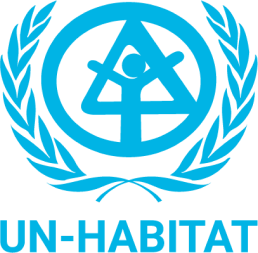The weeklong 2018 International Placemaking Week (Wuhan, China) was held successfully in Wuhan city, China from 9 to 13 December 2018. The Placemaking Week, with the theme of “Remaking Places-Transforming Cities: Shaping Better Public Space”, was hosted by UN-Habitat and Wuhan Municipal People’s Government, convened by the Wuhan Land Resources and Planning Bureau, and implemented by the Wuhan Land Use and Urban Spatial Planning Research Center (WLSP) and the Wuhan Planning and Design Institute (WPDI). The events were also supported by the International Society of City and Regional Planners (ISOCARP), the Project for Public Spaces (PPS), Huazhong University of Science and Technology (HUST) and Wuhan University (WU).
On 11 December 2018, nearly 500 government officials, experts, scholars, planners and students from 41 countries attended the Plenary Session, which was held in Wuhan Conference Center. Mr. Zhang Jun, the Deputy Secretary-General of Wuhan Municipal People’s Government moderated the opening ceremony.
Mr. Wang Xiangwang, Vice Mayor of Wuhan Municipal People’s Government, delivered a welcome speech and briefly introduced the background of the placemaking week.
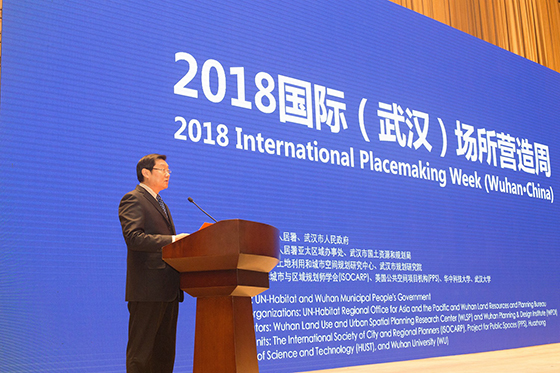
Ms. Maimunah Mohd Sharif , UN Under Secretary General and Executive Director of UN-Habitat, sent the video message for the opening speech, expressing appreciation of participants’ commitments and emphasizing the importance of public space to a prosperous city.
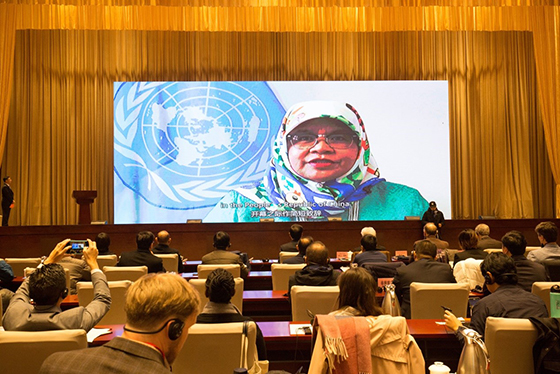
Mr. Wu Hua, Assistant Director of the Land and Space Planning Bureau of Natural Resources Ministry, P.R. China, delivered opening remarks about the background and principles of urban space planning in China, and expressed willingness of further cooperation with UN-Habitat.
Mr. Sheng Hongtao, Director of Wuhan Land Resources and Planning Bureau, published Wuhan Declaration, and requested the participants to make 7 commitments: creating connected and accessible spaces, developing healthy, close-to-nature places, building unimpeded streets, upgrading public spaces, supporting innovative statutory planning, improving place governance and management system, and ensuring safety in and equal access to public spaces.
Mr. Raf Tuts, Director of Programme Division of UN-Habitat, Mr. Martin Dubbeling, President of ISOCARP, and Mr. Phil Myrick, CEO of PPS gave the support statement.
Mr. Raf Tuts, Mr. Martin Dubbeling, Mr. Phil Myrick, Mr. Wu Hua, Mr. Zou Qingping, Deputy Director of Hubei Natural Resource Department, Mr. Wang Xiangwang, and Mr. Sheng Hongtao launched China Placemaking Network. The network will conduct the activities to promote the knowledge sharing for placemaking of best practices, cases study and public participation.
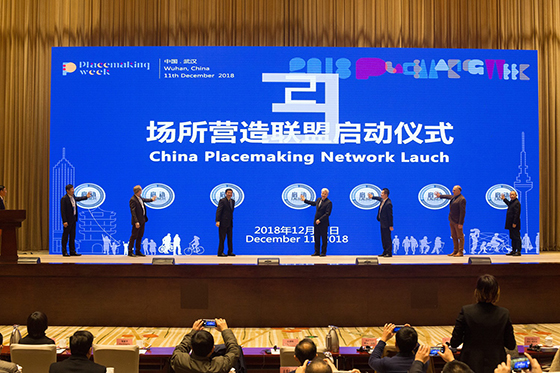
Launch Ceremony of China Placemaking Network 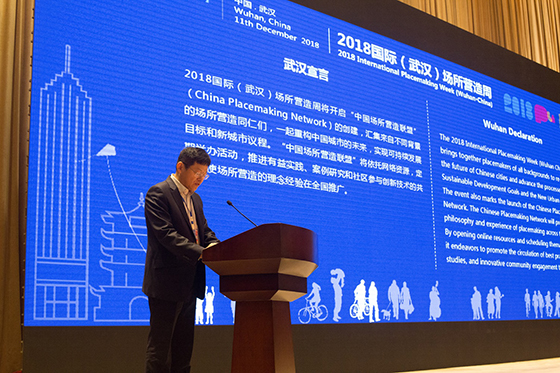
Mr. Sheng Hongtao published Wuhan Declaration
Mr. Bruno Dercon, Senior Officer of UN-Habitat Regional Office for Asia and the Pacific as the moderator of second half of plenary, introduced collaboration with Wuhan in the last three years, especially Wuhan City Prosperity Initiative.
Five keynote speeches were delivered by Mr. Sheng Hongtao, director of Wuhan Land Resources and Planning Bureau, Mr. Martin Dubbeling, president of ISOCARP, Ms. Caroline Bos, Co-founder of UN Studio, Mr. Phil Myrick, CEO of PPS, and Ms. Jennifer Keesmaat, the former Chief Planner and Mayoral Candidate of Toronto, Canada.
Mr. Sheng Hongtao advocated on “planning for the development of urban public space together and discussing the construction of high quality public space together”. He further introduced Wuhan’s efforts in top-level design and planning practices under the concept of “green& sharing”.
Mr. Martin Dubbeling gave the introduction of planning principles for successful cities, including focusing on energy transition and mobility transition, connected, inclusive, resilient, green cities, investing in the livability of the countryside and villages, making inner cities more attractive, making cities adaptive to climate change, resilient and responsible with water.
Ms. Caroline Bos presented projects of different scale to illustrate how UN Studio utilize the urban design potentials of water and use water to improve public city life and connectivity for everyone.
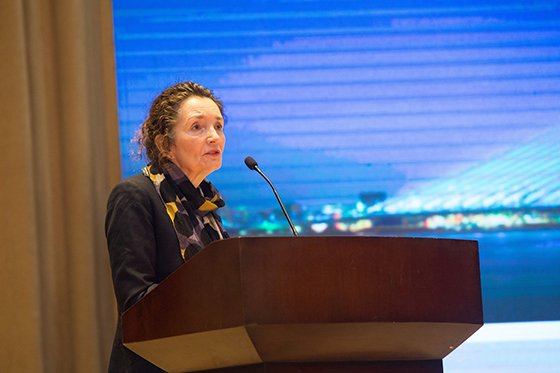
Mr. Phil Myrick proposed to build the social city by comparing two methods of urban design: project-led approach and place-led approach.
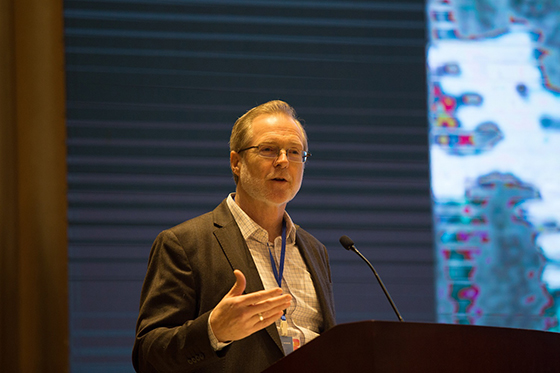
Ms. Jennifer Keesmaat listed five principles of urban design: walkable neighborhoods, bring a critical mix of uses into close proximity, design details, heritage preservation, and clean land, air and water.
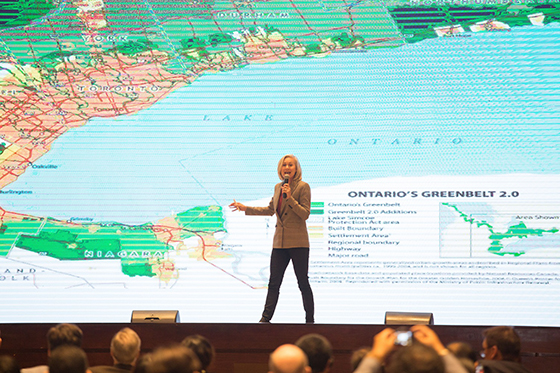
UN-Habitat and WLSP co-organized 2018 International Urban Design Student Competition(Guibei Area)on July, 2018. The competition jury selected and issued the certificate 3 laureate teams and 7 finalists from 5 countries, which are China, USA, Malaysia, Bangladesh and Australia.
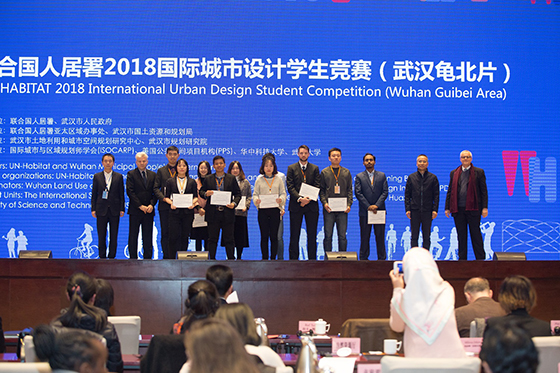
In the end, Mr. Raf Tuts made the conclusion. He stated that after adopting the Wuhan Declaration, there was a new start to implement the SDGs, which included knowledge management, technical cooperation and collaborative partnership network establishment. The public space needed the policy and system support in the city and national level.
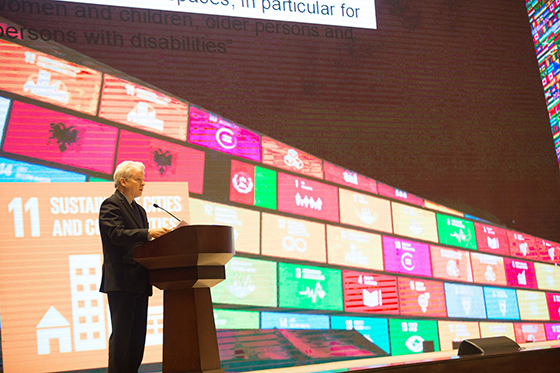
On the afternoon of 11 December and whole day of 12 December 2018, the Placemaking Week held four parallel sub-sessions, on the themes of Waterfront Placemaking, Historical Street Placemaking, Placemaking with Communities and Placemaking for Healthier Communities at the premises of WPDI, WLSP, WU and HUST respectively. The four sub-sessions gathered experts and participants to discuss in-depth in how to shape the better placemaking.
